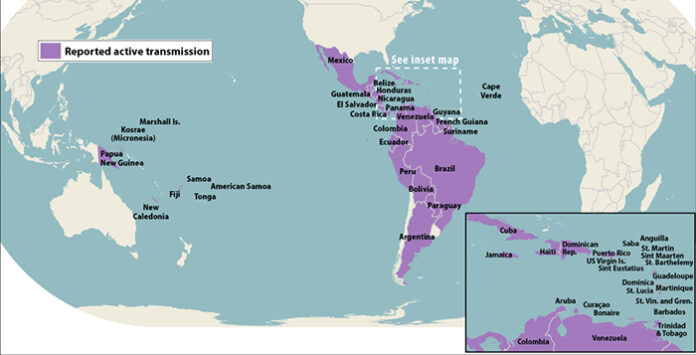Pinal County has been working for several weeks on Zika surveillance and response plans. Given the recent spread of Zika in Florida, Director of Pinal County Public Health Tom Schryer is sharing surveillance and response information with the community.
Unlike West Nile Virus, in the case of Zika, the human is the carrier so once someone is identified as having Zika it is essential that they do all they can to avoid mosquito bites since a mosquito can spread the infection to another human.
“If we have a case of Zika in Pinal County, our plans include inspecting the property of the victim and surrounding properties within 150 meters for any signs of mosquito breeding and take aggressive actions to reduce the mosquito population so anyone who has Zika does not spread the virus to a mosquito that can then pass it on to other people,” Schryer said.
Additionally, Public Health will survey the health of those residents who live within 150 meters of the impacted residence to determine if there is any community transmission. If there is any evidence of transmission, then the boundary will be expanded based on certain criteria.
Pinal County routinely traps for mosquitoes. These traps are brought to the public health lab, where each mosquito is examined and sorted by breed and tested to determine if there is a public health concern.
“So far we have seen extremely low numbers of the Aedes aegypti mosquitos, the mosquito known to transmit Zika, Chikungunya and Dengue Fever, which provides some comfort,” Schryer said. “However, we must remain diligent to reduce or eliminate mosquito breeding and ultimately mosquito bites.”
When discussing Zika risk for pregnant women Schryer emphasized, “It is extremely important for those planning on having a baby to avoid mosquito bites and be aware that Zika can be passed through unprotected sex if one of the partners has Zika. We recommend women planning a pregnancy work closely with their physician early on.”
To date Arizona has had 13 travel-related human cases of Zika virus and there has not been any known transmission within the state. Pinal County has no known Zika cases.
Public Health is working with local medical providers on surveillance for Zika and other arboviruses. Since pregnant women and their unborn children are the most vulnerable to Zika and have the only known long term health consequences, women should have access to enhanced monitoring while pregnant or planning a pregnancy. There is testing available for Zika when indicated, and it is important that health care providers report suspected cases to their local health departments to facilitate diagnosis and mitigate the risk for local transmission.
What are the symptoms of Zika?
The most common symptoms of Zika are fever, rash, joint pain, and red eyes. About one in five people infected with Zika will get sick, and symptom onset is usually two to seven days after being bitten by an infected mosquito. For people who get sick, the illness is usually mild and lasts a week. It is important to note that Zika can be transmitted from a pregnant mother to her baby during pregnancy, and can result in a birth defect known as microcephaly.
How can you protect yourself from mosquitoes and stop the spread of Zika?
There is no vaccine to prevent or medicine to treat Zika virus infection so prevention is essential. You can protect yourself, your family and your community by reducing the sources of mosquito breeding near your home, and avoid getting mosquito bites by using air conditioning, window and door screens on your home, wearing long sleeves and pants, and using insect repellents when outdoors. Women who are planning to become pregnant should avoid travel to areas of the world that are known to have active Zika transmission.
Aedes aegypti mosquitos, the mosquito that transmits Zika from human to human live near homes so it is essential that all residents are diligent in their efforts to reduce mosquito breeding.
To help prevent mosquito breeding and spreading Zika or other arboviruses, Pinal County Public Health recommends the following:
• Get rid of any items outside the home that can collect water to prevent mosquitoes from laying eggs.
• Repair leaks to prevent standing water.
• Change water in flower vases, birdbaths, planters, troughs, and animal water dishes at least twice a week.
• If you have a swimming pool, keep it operational by using chlorine and running the filter frequently.
• Repair any damaged screens on both windows and doors.
To file a complaint regarding mosquitoes in Pinal County, please call the Environmental Health hotline at 1-866-287-0209 or visit www.pinalcountyaz.gov/ehs. For more information on Zika and pregnancy, please visit www.cdc.gov/zika/pregnancy.


















![Elena Trails releases home renderings An image of one of 56 elevation renderings submitted to Maricopa's planning department for the Elena Trails subdivison. The developer plans to construct 14 different floor plans, with four elevation styles per plan. [City of Maricopa]](https://www.inmaricopa.com/wp-content/uploads/2024/04/city-041724-elena-trails-rendering-100x70.jpg)